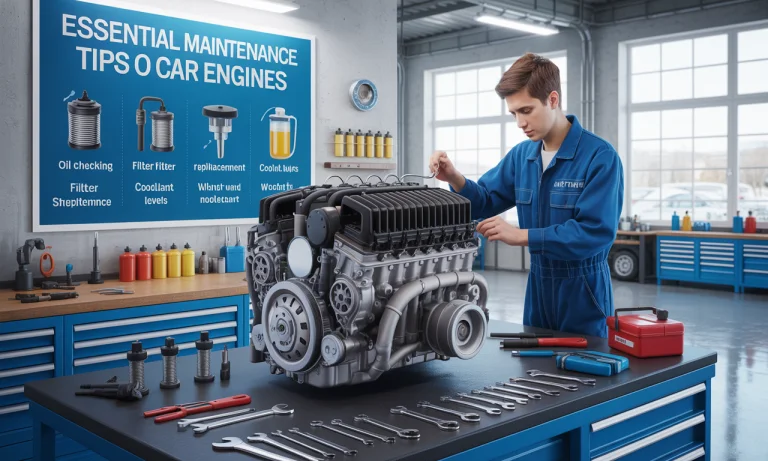In a bustling garage at the edge of the city, a seasoned mechanic named Sam rolled up his sleeves. Around him, engines hummed and customers hustled in with the hope of having their vehicles last just a little longer. For many, a car engine’s health could mean the difference between a smooth commute and a breakdown in the pouring rain. Today, the importance of keeping that engine running seamlessly isn’t just common sense—it’s a necessity amid rising fuel costs, evolving engine technologies, and the knowledge that even one missed maintenance step could spell disaster. Through Sam’s eyes, let’s uncover the secrets to extending engine life, cutting costs, and ensuring every journey—whether across town or the countryside—goes off without a hitch.
Understanding Why Car Engine Maintenance Matters in Modern Times
Walk into Sam’s workshop and you sense it: the heartbeat of modern mobility is the engine. This intricate piece of machinery, whether a robust V6 or a turbocharged inline-four, fares best with attentive care. Consistent maintenance not only prevents heroic roadside rescues but also unlocks the full potential of brands like Mobil 1, Castrol, and Shell, famed for high-performance lubricants. The numbers are clear—a properly serviced engine can last years beyond its warranty, delivering trustworthy power, fuel savings, and steadfast reliability, even as new electric models reshape the landscape. Curiosity about electric alternatives is rising, as explored in this breakdown of hybrids and electrics. Still, for those loyal to combustion, the value of classic engine care is undeniable.
| Benefits | Impact on Engine | Cost Savings |
|---|---|---|
| Regular Oil Change | Reduces friction, prevents overheating | Can save up to $2,000 in repairs |
| Coolant System Service | Prevents overheating, corrosion | Extends radiator life |
| Scheduled Inspections | Early detection of issues | Avoids major engine failures |
Essential Oil and Filter Changes: The Lifeline of Your Engine
In Sam’s bay, engines that run on clean oil seem to whisper their gratitude. He’s seen what happens when drivers ignore this core ritual—grimy sludge choking delicate components, repair bills spiraling. A blend from Mobil 1 or Castrol doesn’t just lubricate; it protects, especially when paired with superior filters from Bosch or K&N. Most handbooks recommend oil changes every 5,000 to 7,500 miles, but Sam’s experience is clear: listen to your driving habits and environment. For those unsure about the signs, resources like these warning signs point out when servicing is due. The combination of synthetic oil and reliable filters isn’t just a recommendation—it’s an investment in fewer breakdowns and lower long-term costs.
Monitoring Fluids and Cooling Systems for Engine Health
Behind every smooth journey lies a harmonious balance of essential fluids. Beyond engine oil, the silent actors—coolant, brake, and transmission fluids—play their part. Sam’s toolkit features brands like Valvoline and Pennzoil, recognized for their dependable products. Regular checks, outlined in comprehensive maintenance guides, reveal low levels before the damage is irreversible. The stakes are high: neglected coolant can result in overheating, a common culprit as detailed by current case studies of engine failures, and cracked hoses or worn belts could sideline even the best-tuned engines. Tales from Sam’s shop recount customers whose vigilance saved them thousands, reinforcing that attention to fluids is the unsung hero of engine longevity.
| Fluid Type | Check Interval | Recommended Brands |
|---|---|---|
| Engine Oil | 5,000 – 7,500 miles | Mobil 1, Castrol, Shell, Valvoline |
| Coolant | Every 3 months | Pennzoil, STP |
| Brake/Transmission | Check monthly | STP, Valvoline |
Intake, Spark, and the Breathing Engine: Air Filters and Spark Plugs
Sam often draws parallels between engines and athletes—both require clean air and a strong spark to perform at their best. He’s partial to air filters from K&N and spark plugs from NGK and Denso; proven choices in modern vehicles. An air filter clogged with grit can suffocate horsepower, while old spark plugs transform acceleration into a sputtering ordeal. Manufacturers suggest new filters every 12,000 to 15,000 miles, but a visual check at each service interval is smart. Similarly, upgrading to platinum or iridium-tipped plugs can add tens of thousands of trouble-free miles, a trick Sam swears by. The science behind these choices—expanded in this primer on engine anatomy—makes one thing clear: maintenance isn’t just about longevity, but also peak daily enjoyment.
The Hidden Threats: Timing Belts, Warning Noises, and Common Mistakes
While most drivers feel confident with fluids and filters, Sam sees many underestimate the power of timing belts and the voice of their own engines. Too often, warning signs—a faint ticking, a persistent rattle—go ignored until the engine stops cold. Timing belts, responsible for keeping moving parts in perfect harmony, should never be stretched beyond 100,000 miles. Sam recalls a customer whose hesitation led to catastrophic failure—her story echoes guidance found in these longevity tips. Pairing careful listening with preventive replacement is the wisest course. Modern diagnostics and apps can help, yet there’s nothing quite like the seasoned instinct of a mechanic attuned to every whir and click.
| Warning Sound | Probable Cause | Recommended Action |
|---|---|---|
| Knocking | Worn bearings, detonation | Inspect internals, check oil |
| Ticking | Valve train issues, low oil | Add/change oil, adjust valves |
| Squealing | Loose belt | Tighten/replace belt |
Driving Style and the Manufacturer’s Roadmap: How Habits Shape Engine Life
Sam’s regulars are often surprised when he links engine health to their driving style. A cautious driver—one who accelerates smoothly, allows for gentle braking, and respects warm-up routines in winter—naturally extends the life of vital components. In an age where apps log every mile and alert owners to missed milestones, those who blend best practices with manufacturer recommendations see the greatest rewards. Modern guides like this all-in-one resource lay out personalized schedules, including reminders for services such as spark plug swaps or coolant flushes. Combining the precision of brands like STP with the wisdom in the owner’s manual is a recipe for reliability, not just in 2025 but for years to come. Driving with intention—like following tips from evolving engine tech resources—represents the new era of empowered car ownership.
Journeys Ahead: Embracing Engine Maintenance in a Changing Automotive World
As Sam packs up at the end of the day, he reflects on the shifting tides in automotive care. Electric cars are on the rise, but for millions still steering petrol or diesel vehicles, mastering engine upkeep remains both art and science. Tools and techniques have evolved—from high-tech oils like Mobil 1, Castrol, and Shell to robust filters by Bosch and K&N. The digital age brings helpful reminders and transparent comparisons, seen in guides such as modern engine reviews and EV test drives. Yet, old-fashioned vigilance—listening for trouble, respecting scheduled checks—is at the core of a dependable ride. For those curious about the cost differences, detailed breakdowns compare traditional and electric upkeep. By embracing both modern advances and time-tested wisdom, drivers empower themselves to keep their engines—and lives—moving forward without interruption.
| Maintenance Task | Frequency | Recommended Products | Key Resource |
|---|---|---|---|
| Oil/Filter Change | 5,000 – 7,500 miles | Mobil 1, Castrol, Bosch, K&N | Engine Longevity |
| Coolant Flush | 30,000 miles | STP, Valvoline | Warning Signs |
| Air Filter Replacement | 12,000 miles | K&N | Engine Basics |
| Spark Plug Replacement | 30,000 – 100,000 miles | NGK, Denso | Full Guide |
Answers to Common Engine Maintenance Questions
How often should I change my car’s engine oil?
The consensus among mechanics is every 5,000 to 7,500 miles, though some newer vehicles and synthetic oils can safely stretch longer. Always consult your vehicle’s owner’s manual for specifics and consider premium brands like Mobil 1 or Castrol for longer intervals.
What happens if I skip regular air filter or spark plug changes?
Neglect can lead to poor acceleration, reduced fuel efficiency, hard starts, and even engine misfires. Swapping in recognized products like K&N filters and NGK spark plugs helps maintain top performance without costly surprises.
Which warning signs should I never ignore with my engine?
Any new noise—knocking, ticking, squealing—alongside dashboard warning lights, smoke, or overheating. Brave the inconvenience and have a mechanic inspect it. Early detection, outlined in resources like this practical guide, saves far more than it costs.
Can DIY maintenance really extend my engine’s life?
Absolutely—with the right knowledge and quality parts, many routine tasks can be safely handled in your garage. Rely on trusted brands like Bosch and Valvoline, and supplement your learning with resources such as technology evolution reports.
Are maintenance intervals different for electric and hybrid cars?
Significantly so—EVs have fewer moving parts and less frequent fluid replacements. For comparisons and city commuting insights, explore this EV resource or charging cost breakdowns.
Did you like it? 4.5/5 (26)






